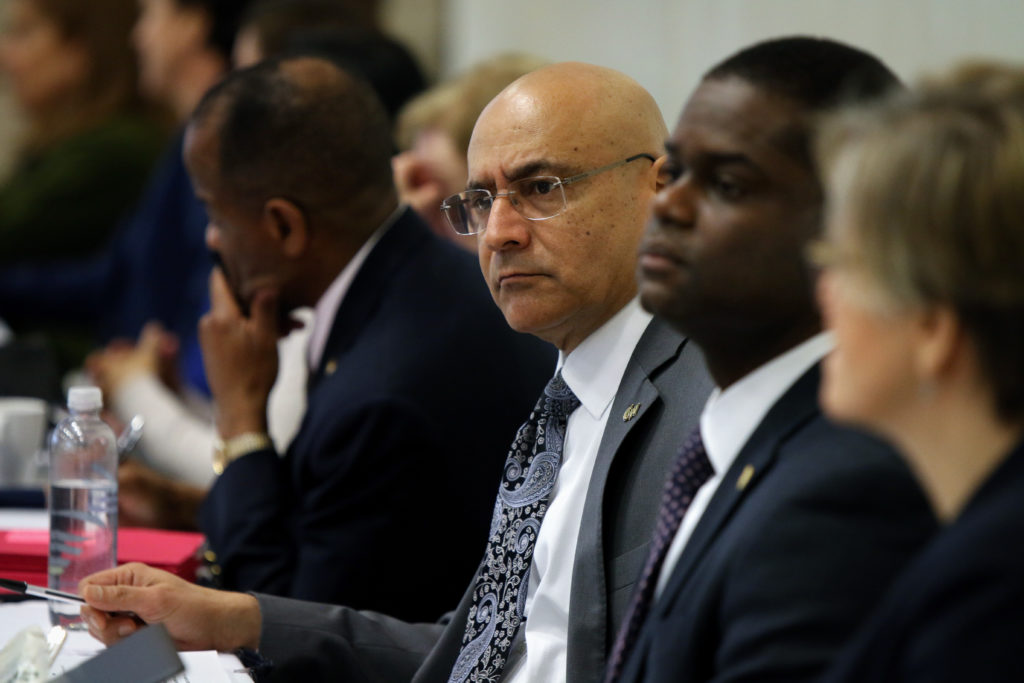The School of Business is offering non-business majors a new academic opportunity to pick up professional skills.
Nearly a year after the business school debuted its first minor for students outside the school, officials announced that they will launch a business minor. Officials and experts said the minor will give students studying multiple disciplines a leg up in the job market, where any knowledge of business is often a valuable asset.
“We are also committed to an intra-disciplinary approach to business education, for example by integrating analytics and technology electives into GWSB programs and developing a business minor for non-business students,” Anuj Mehrotra, the dean of the business school, said in a message to students last week.
University spokesman Jason Shevrin said the minor is still in the planning phases, but officials will release information as soon as it becomes available. He declined to say when the minor is expected to launch and who is working on its development. He also declined to say what the curriculum will entail and if new courses will be added for the minor.
“The business minor for non-business students will allow students to supplement their major concentration of study with practical business knowledge that they can apply in their career field of choice,” he said in an email.
University President Thomas LeBlanc has said that he wants to make it easier for students to double major and minor in fields that have few overlapping courses. LeBlanc lauded a new Bachelor of Science in international affairs earlier this month, saying the option would help students pursue double majors in international affairs and science and technology fields.
More than half of GW’s peer schools, including the University of Miami and Syracuse University, give students the option to minor in business.
Directors of business minors at other institutions said recruiters often tell university administrators that students lack communication skills and basic knowledge of business operations, which the minor could provide.
Gary Kimball, the director of the business minor at Vanderbilt University, said more students are entering college with ambitions to launch their own companies or startups, and the business minor could give students marketing and other business skills to help make those dreams a reality.
“It’s a matter of reading what students are interested in and seeing if we can complement that with the curriculum,” he said.
Kimball added that many students who minor in business at Vanderbilt are majors in human and organizational development and ultimately pursue careers in consulting because of the skills they acquire in the minor.
Rick Schell, the director of the business minor at Rice University, said that since the minor debuted in 2007, demand from students has been so high that he has had to add four or five sections to some of the six courses offered in the program.
He said that although many students in the minor go on to pursue master’s degrees in business, the teamwork and interpersonal skills students gain can be used in any professional career. Developing a curriculum for students from all backgrounds differs greatly from creating a curriculum for business students, meaning officials must start from scratch and assume students have no prior business experience, Schell said.
“We backed some of that out knowing they may not have had a summer job or internship, never interviewed for a full-time job,” he said. “It’s not that we dumb down the curriculum. We just take out things knowing that students have never had experience in the real business world.”
Lisa Beisser, the director of admissions and strategic initiatives at the University of North Carolina Kenan-Flagler Business School, said the school admitted its largest-ever minor class last year, taking on about 60 students.
She said students studying science and technology have increasingly demonstrated interest in the business minor because they realize that basic business know-how could help them run their own firm or hospital one day. Beisser added that administrators may have to market the minor to students who may not realize that their career paths could benefit from business skills.
“There might be a little bit of a marketing campaign that you want to do to make sure that people recognize that a lot of these fields that they are thinking of pursuing that don’t immediately benefit a business can really, really benefit from those strong business skills,” she said.





